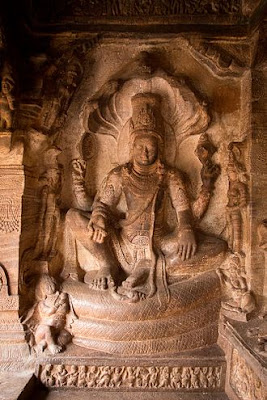Reading Notes: PDE Ramayana, Part D
These notes were taken as I was reading through the Public Domain Edition of the Ramayana, by Valmiki.
The Bridge
Okay, so let me get this straight. Rama, because he wants to get his wife back, had to cross an ocean to get there, but when his offering to the God of the Ocean failed, he basically threw a tantrum. The thing is, his tantrums aren't like your toddler's; when he throws one, it has a global impact. On top of that, he threatens to dry up the sea. I mean, I'm no marine ecologist or anything, but that seems like a VERY serious threat, not only because of the impact on life, but because of that fact that he can do it on a whim. I feel like he should have more responsibility, especially knowing his power.
Indrajit
Ah, so this is where the story of "Hanuman Saves the Day" comes from, maybe? Where he flies off to find an herb to revive the dying/dead Lakshmana, but then, because he can't find the herb, decides to just bring back the entire mountain. But it seems like, in the actual Ramayana, he doesn't do that. Instead, Garuda comes and heals everyone.
Hanuman and the Mountain
Woops, looks like this is the actual part, and he does do it, though Lakshmana isn't dying here. Interesting. Poor monkeys though. They were beaten pretty bad, then healed by Garuda. Then they were completely dominated by Indrajit and his almost cheat-level weaponry, then healed again. It's like a torture. Maybe I could write a story from the perspective of one of the monkey soldiers, waiting for the sweet release of death...
Ravana and Lakshmana
...Okay. So here Lakshmana IS dying, pierced through the heart. But Hanuman saves him with some healing herbs from that one mountain. So it looks like the story of Hanuman saving the day combines this and the above chapters. However, as someone who has studied anatomy before...healing herbs won't heal a spear through the heart, especially if it's only administered through smell alone. I mean, I guess they're blessed by the gods, but still, either the herbs are just ridiculously and unrealistically powerful (yet they haven't been completely stripped off the mountain yet? Come on, greedy nature of man, where you at?) or their bodies are just ridiculous and unrealistic.
Sita is Tested
Turns out, Rama isn't just some human blessed by the gods. He's actually Narayana, also known as Vishnu. Yeah, not a big deal except Vishnu is the absolute deity in Hinduism, creating the universe(s) through the "creative aspect" of himself, known as Brahma. Guess who's telling him all this? Brahma. So he's basically being praised by himself here. And this explains why all the seemingly overpowered antagonists he's met have been defeated in like, a paragraph.
Valmiki's Hermitage
Wrapping up the story here, I'm again shocked. After all that time in exile, the hardships Rama went through to recover Sita from Ravana...he exiles her?! Because the people thought she was soiled by Ravana? Wasn't that test by fire supposed to be the solution to this? WEAK Rama. Weak. And not suspicious at all was that she went to stay at Valmiki's place. Then gave birth to two sons shortly after? And they are stronger than Rama's brothers? And Rama didn't even know he had sons? I have so many questions. Why Rama, why?
And so we come to the end of the Ramayana. I have a lot of questions, but that feeling of finishing something - it's still satisfying. Sita, in a testimony to her purity, departs, swallowed up by the earth. And Rama, returning to his original form of Vishnu, goes to the heavens.
(depiction of Narayana, a.k.a. Vishnu, from Wikipedia)
It's been a wild story,
Smith Tuangswang



Comments
Post a Comment